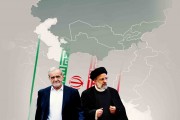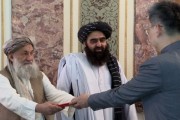Publish Date
Sunday 13 September 2020 - 13:37
recommended
0
The Prospect of Afghanistan’s Order in the Post–Withdrawal Era
Following the US invasion of Afghanistan in 2001, the presence of the US forces became one of the main variables in analysis of the order of Afghanistan and even the region. During these years, the Americans have constantly increased or decreased their forces based on the regional developments, the intensity of terrorist activities, and political changes in the White House. But, after 2014, they seriously decided to put the complete withdrawal from Afghanistan at the top of their agenda. The option particularly entered a new phase after the US peace agreement with the Taliban in early 2020. Moreover, the field developments as well as the statements that are made by the US officials can prove their seriousness. Regardless of Washington’s intention, this sharp decline in the US forces, on the one hand, would affect Afghanistan's domestic actors and trends, thereby shaping the country’s outlook for order and, on the other, can change the strategies of the regional powers.
By: Seyed Ahmad Fatemi Nejad
Following the US invasion of Afghanistan in 2001, the presence of the US forces became one of the main variables in the analysis of Afghanistan’s and even the region’s order. During these years, the Americans have constantly increased or decreased their forces in Afghanistan with regard to the regional developments, the intensity of terrorist activities, and changes in the White House. But after 2014, the US officials have put the reduction or withdrawal of their forces at the top of the agenda. This option has entered a new phase following the US peace agreement with the Taliban in 2020. The daily developments and the statements by the US officials also show that the Americans are serious about their decision. Regardless of Washington’s intention, the main question is that what would be the impacts of such a drastic change on Afghanistan’s order and also the whole region?
To answer this question, one must consider the status of influential factors in Afghanistan’s current order and evaluate their possible changes after the complete withdrawal of the American troops. Therefore, in the following, the internal and external factors affecting Afghanistan’s order are respectively examined.
The first important factor is the situation of the central government of Afghanistan after the withdrawal of the US forces. The United States is trying to stabilize the situation of the Afghan central government before/Simultaneously with departure. The stability and authority of the government are more influenced by two elements: The quality of the Taliban's relationship with Kabul and the management of ethnic tensions.
During the recent months, the US has sought to resolve the first issue through signing a peace accord with the Taliban and accepting the group's participation in the political procedures. To cover up the second issue, Washington has divided the country’s affaires between President Ghani and Dr. Abdullah. But, the problem is that none of these issues have reached a clear conclusion. On the one hand, the Taliban repeatedly emphasize that it does not accept "Kabul’s administration" as the government of Afghanistan and is only committed to the inter-Afghan talks. Meanwhile, the implementation of the Taliban's prerequisite, including the release of the prisoners, is also facing many challenges. On the other hand, the ethnic tensions over the control of the Presidential Palace have gone beyond the Ghani-Abdullah disputes and the current temporary reconciliation between them does not seem lasting.
The status of the Afghan military is the second factor. Generally, the presence of the US forces appears to be affecting the Afghan National Army (ANA) strategically, operationally, educationally and financially. The absence or reduction of the US troops naturally affects the quality of the ANA on a large scale. In particular, the Afghan military is likely to suffer a significant operational and financial decline, something that will directly impact Afghanistan’s order.
The third important factor is the quality of the activities of the international institutions, which will more or less be affected by the withdrawal of the American troops. While the role of these institutions in the context of Afghanistan’s current order may not seem so vital, but their impacts on the daily affairs of the Afghan society, from education and health to trade and agriculture, cannot be denied. Maybe the activities of these institutions are not directly related to the presence of the American forces, but the possible instability and lack of attention to Afghanistan’s situation in the wake of the US withdrawal will affect the activities of such institutions.
The activity of the militant groups in Afghanistan after the US withdrawal is the fourth factor. The militant and sometimes proxy forces operating in Afghanistan, on the one hand, affect Afghanistan’s order and, on the other hand, are influenced by the activities of the US forces. In this case, we can mention the name of many small and large militant groups - such as different factions of the Taliban, the IS-K, the ethnic militias, the supporters of former military commanders, and even armed groups in certain villages - which have a potential or active presence in Afghanistan and The quality of their activities is affected by the presence of American forces. Obviously, the reduction of the American forces will change the situation of these groups and also the quality of their activities. The recruitment status of these groups as well as their splits and Alliances can greatly affect Afghanistan’s order. It is possible for some of the dissidents and rebels of the Taliban to join the ranks of the IS-K over the time and practically neutralize the Taliban’s peace agreement with Washington. Also, due to the expansion of the IS-K in Afghanistan, new militant groups may come into being. All of these issues cause that the geography of militancy and the impacts of the US withdrawal on it, turn into one of the main concerns and influential factors in the perspective of Afghan order.
The last major factor is the rearrangement of forces and the rebalance of regional powers in Afghanistan following the withdrawal of the US troops. As mentioned above, the United States has been one of the most important actors in Afghanistan over the past two decades. The US has influenced the security processes in Afghanistan and even in the region through its own forces. Therefore, it is obvious that in the absence of the US, other regional rivals will try to fill the vacuum and pursue their basic interests. In this regard, the strategies and considerations of China, India, Pakistan and Iran after the US withdrawal should be evaluated separately:
China’s considerations: Beijing is first and foremost concerned about peace and stability in its periphery. Hence, the high-ranking Chinese officials have repeatedly stressed that the US withdrawal from Afghanistan must guarantee the country’s stability. Via a glimpse into the history of the regional convergence trends and China's economic ties, one can clearly understand that the country has benefited the most in areas that are stable. It is no coincidence that the eastern parts of China are more developed than southwestern and western regions, because Beijing has focused on economic ties with East Asia, not South or Central Asia. Hence, from China’s perspective, the favorable Afghanistan would be a stable country that provides the necessary conditions for China’s economic activities and at the same time does not hurt Beijing’s economic relations with other countries, especially Pakistan. Moreover, the influence that the Uyghurs get from Afghanistan situation is important to China, especially in the new situation that the international community is closely observing the Uyghurs’ status. Previously, the presence of the US forces in Afghanistan was also mentioned as one of the main external threats against China; a concern which naturally will diminish after the withdrawal of the US troops. All in all, China's most important consideration about Afghanistan is that it wants to have no concerns about Afghanistanin and can freely focus on countering the US strategies in other regions, including India as well as East and Southeast Asia.
Russia's considerations: The US military invasion and occupation of Afghanistan in 2001 was one of the few post-Cold War interventions that not only did not faced Russia’s opposition, but also was accompanied, especially in the early days, by Moscow’s sympathetic approach. But as the years passed, the differences between the US and Russia became clearer, and now Russia naturally welcomes the US withdrawal from or reduction of forces in Afghanistan. Russia has grown closer to the Taliban over the years, and recently has stepped up its diplomatic efforts at the intergovernmental and non-governmental levels to bring order to Afghanistan. Moscow believes that the Taliban, unlike the IS-K, has a nationalist approach and will focus on Afghanistan. Therefore, its ideology and approach do not pose a threat to Russia.
So, one can claim that Russia's main concern is to expand its influence in Afghanistan, as in Syria. The difference is that Russia chose the direct military intervention in Syria and now it is using the diplomatic tools and the power of proxy groups to secure its own interests in Afghanistan. Meanwhile, the US withdrawal from Afghanistan, on the one hand, will confirm the decline of the country's hegemony in the areas close to Russia and on the other hand, would pave the way for the presence of Russia’s allies such as Pakistan or Iran in Afghanistan.
India’s considerations: It seems that India knows itself as the loser of the new conditions in Afghanistan which stems from the Taliban-US peace agreement as well as the US withdrawal. This feeling would be more tangible if we consider that most of India's success in Afghanistan has been due to the country’s relative stability and Kabul’s expansionist policies under the shadow of the US presence. Moreover, throughout the years of US struggle against the Taliban, India sought to create a kind of "identity" between itself and the United States and to present India, like the US, as a victim of Islamic radicalism. For example, the Indian media and politicians hardly tried to equate the 9/11 attacks on the United States with the 2001 attacks on the Indian parliament. In addition to drawing Washington’s attention to India, this strategy could facilitate and justify New Delhi's approach towards the Islamists and Pakistan. With the new situation emerging, India will not only be disarmed, but also must witness the rise of Pakistan's influence in Afghanistan. Although India has not formally expressed its opposition against the Taliban-US agreement, there are some unofficial evidence that show New Delhi is eager to see the failure of the agreement and also the continuation of the US presence. This concern may even push New Delhi towards unexpected options, such as indirect cooperation with the IS-K or other opposition groups in Afghanistan.
Pakistan's considerations: The new situation in Afghanistan, no matter how bad it is for India, seems good and favorable to Pakistan. Apparently, the goal that Pakistan pursued in the 1990s through military operations of the Taliban is being achieved through diplomacy in the 2020s. Pakistan has always felt weak against India in term of strategic depth and the leaders of Islamabad have tried to overcome this weakness by expansion of their influence in Afghanistan. If things go well and the Taliban gain power in Afghanistan, it will push Pakistan closer to its goal. If we put this factor beside Pakistan's growing relations with China as well as the Beijing-
Delhi tensions, the role of Islamabad will become more significant in Afghanistan's future.
Iran considerations: The US withdrawal from Afghanistan and the whole region is one of the main goals of Iran's foreign policy. So far, it seems that the US withdrawal will fulfill one of Iran's goals. But at the same time, one should notice that achieving this goal may pose threats to Iran, the most important of which is the Afghanistan’s instability and Pakistan’s widespread influence. Afghanistan's instability would hamper Iran's investments and economic ties with the country, and the widespread influence of Pakistan and the Taliban would remind the past conflicts. Based on this point of view, it seems that various balance of powers in Afghanistan will help Iran more than the dominance of a particular approach or country. Moreover, if the withdrawal of US troops threatens Afghanistan's immature democracy, the situation of Iran-back minorities will be in danger too.
Overall, the withdrawal of US troops from Afghanistan would affect the relative balance that exists in the country. This phenomenon, on the one hand, by affecting Afghanistan’s internal actors and trends can shape the vision of the country's order, and on the other hand, can influence the strategies and power trends of the region. In each of these paths, there are several options and possibilities that may change the order of Afghanistan and the region.
Seyed Ahmad Fatemi Nejad is Assistant professor of International Relations, Ferdowsi University of Mashhad
Following the US invasion of Afghanistan in 2001, the presence of the US forces became one of the main variables in the analysis of Afghanistan’s and even the region’s order. During these years, the Americans have constantly increased or decreased their forces in Afghanistan with regard to the regional developments, the intensity of terrorist activities, and changes in the White House. But after 2014, the US officials have put the reduction or withdrawal of their forces at the top of the agenda. This option has entered a new phase following the US peace agreement with the Taliban in 2020. The daily developments and the statements by the US officials also show that the Americans are serious about their decision. Regardless of Washington’s intention, the main question is that what would be the impacts of such a drastic change on Afghanistan’s order and also the whole region?
To answer this question, one must consider the status of influential factors in Afghanistan’s current order and evaluate their possible changes after the complete withdrawal of the American troops. Therefore, in the following, the internal and external factors affecting Afghanistan’s order are respectively examined.
The first important factor is the situation of the central government of Afghanistan after the withdrawal of the US forces. The United States is trying to stabilize the situation of the Afghan central government before/Simultaneously with departure. The stability and authority of the government are more influenced by two elements: The quality of the Taliban's relationship with Kabul and the management of ethnic tensions.
During the recent months, the US has sought to resolve the first issue through signing a peace accord with the Taliban and accepting the group's participation in the political procedures. To cover up the second issue, Washington has divided the country’s affaires between President Ghani and Dr. Abdullah. But, the problem is that none of these issues have reached a clear conclusion. On the one hand, the Taliban repeatedly emphasize that it does not accept "Kabul’s administration" as the government of Afghanistan and is only committed to the inter-Afghan talks. Meanwhile, the implementation of the Taliban's prerequisite, including the release of the prisoners, is also facing many challenges. On the other hand, the ethnic tensions over the control of the Presidential Palace have gone beyond the Ghani-Abdullah disputes and the current temporary reconciliation between them does not seem lasting.
The status of the Afghan military is the second factor. Generally, the presence of the US forces appears to be affecting the Afghan National Army (ANA) strategically, operationally, educationally and financially. The absence or reduction of the US troops naturally affects the quality of the ANA on a large scale. In particular, the Afghan military is likely to suffer a significant operational and financial decline, something that will directly impact Afghanistan’s order.
The third important factor is the quality of the activities of the international institutions, which will more or less be affected by the withdrawal of the American troops. While the role of these institutions in the context of Afghanistan’s current order may not seem so vital, but their impacts on the daily affairs of the Afghan society, from education and health to trade and agriculture, cannot be denied. Maybe the activities of these institutions are not directly related to the presence of the American forces, but the possible instability and lack of attention to Afghanistan’s situation in the wake of the US withdrawal will affect the activities of such institutions.
The activity of the militant groups in Afghanistan after the US withdrawal is the fourth factor. The militant and sometimes proxy forces operating in Afghanistan, on the one hand, affect Afghanistan’s order and, on the other hand, are influenced by the activities of the US forces. In this case, we can mention the name of many small and large militant groups - such as different factions of the Taliban, the IS-K, the ethnic militias, the supporters of former military commanders, and even armed groups in certain villages - which have a potential or active presence in Afghanistan and The quality of their activities is affected by the presence of American forces. Obviously, the reduction of the American forces will change the situation of these groups and also the quality of their activities. The recruitment status of these groups as well as their splits and Alliances can greatly affect Afghanistan’s order. It is possible for some of the dissidents and rebels of the Taliban to join the ranks of the IS-K over the time and practically neutralize the Taliban’s peace agreement with Washington. Also, due to the expansion of the IS-K in Afghanistan, new militant groups may come into being. All of these issues cause that the geography of militancy and the impacts of the US withdrawal on it, turn into one of the main concerns and influential factors in the perspective of Afghan order.
The last major factor is the rearrangement of forces and the rebalance of regional powers in Afghanistan following the withdrawal of the US troops. As mentioned above, the United States has been one of the most important actors in Afghanistan over the past two decades. The US has influenced the security processes in Afghanistan and even in the region through its own forces. Therefore, it is obvious that in the absence of the US, other regional rivals will try to fill the vacuum and pursue their basic interests. In this regard, the strategies and considerations of China, India, Pakistan and Iran after the US withdrawal should be evaluated separately:
China’s considerations: Beijing is first and foremost concerned about peace and stability in its periphery. Hence, the high-ranking Chinese officials have repeatedly stressed that the US withdrawal from Afghanistan must guarantee the country’s stability. Via a glimpse into the history of the regional convergence trends and China's economic ties, one can clearly understand that the country has benefited the most in areas that are stable. It is no coincidence that the eastern parts of China are more developed than southwestern and western regions, because Beijing has focused on economic ties with East Asia, not South or Central Asia. Hence, from China’s perspective, the favorable Afghanistan would be a stable country that provides the necessary conditions for China’s economic activities and at the same time does not hurt Beijing’s economic relations with other countries, especially Pakistan. Moreover, the influence that the Uyghurs get from Afghanistan situation is important to China, especially in the new situation that the international community is closely observing the Uyghurs’ status. Previously, the presence of the US forces in Afghanistan was also mentioned as one of the main external threats against China; a concern which naturally will diminish after the withdrawal of the US troops. All in all, China's most important consideration about Afghanistan is that it wants to have no concerns about Afghanistanin and can freely focus on countering the US strategies in other regions, including India as well as East and Southeast Asia.
Russia's considerations: The US military invasion and occupation of Afghanistan in 2001 was one of the few post-Cold War interventions that not only did not faced Russia’s opposition, but also was accompanied, especially in the early days, by Moscow’s sympathetic approach. But as the years passed, the differences between the US and Russia became clearer, and now Russia naturally welcomes the US withdrawal from or reduction of forces in Afghanistan. Russia has grown closer to the Taliban over the years, and recently has stepped up its diplomatic efforts at the intergovernmental and non-governmental levels to bring order to Afghanistan. Moscow believes that the Taliban, unlike the IS-K, has a nationalist approach and will focus on Afghanistan. Therefore, its ideology and approach do not pose a threat to Russia.
So, one can claim that Russia's main concern is to expand its influence in Afghanistan, as in Syria. The difference is that Russia chose the direct military intervention in Syria and now it is using the diplomatic tools and the power of proxy groups to secure its own interests in Afghanistan. Meanwhile, the US withdrawal from Afghanistan, on the one hand, will confirm the decline of the country's hegemony in the areas close to Russia and on the other hand, would pave the way for the presence of Russia’s allies such as Pakistan or Iran in Afghanistan.
India’s considerations: It seems that India knows itself as the loser of the new conditions in Afghanistan which stems from the Taliban-US peace agreement as well as the US withdrawal. This feeling would be more tangible if we consider that most of India's success in Afghanistan has been due to the country’s relative stability and Kabul’s expansionist policies under the shadow of the US presence. Moreover, throughout the years of US struggle against the Taliban, India sought to create a kind of "identity" between itself and the United States and to present India, like the US, as a victim of Islamic radicalism. For example, the Indian media and politicians hardly tried to equate the 9/11 attacks on the United States with the 2001 attacks on the Indian parliament. In addition to drawing Washington’s attention to India, this strategy could facilitate and justify New Delhi's approach towards the Islamists and Pakistan. With the new situation emerging, India will not only be disarmed, but also must witness the rise of Pakistan's influence in Afghanistan. Although India has not formally expressed its opposition against the Taliban-US agreement, there are some unofficial evidence that show New Delhi is eager to see the failure of the agreement and also the continuation of the US presence. This concern may even push New Delhi towards unexpected options, such as indirect cooperation with the IS-K or other opposition groups in Afghanistan.
Pakistan's considerations: The new situation in Afghanistan, no matter how bad it is for India, seems good and favorable to Pakistan. Apparently, the goal that Pakistan pursued in the 1990s through military operations of the Taliban is being achieved through diplomacy in the 2020s. Pakistan has always felt weak against India in term of strategic depth and the leaders of Islamabad have tried to overcome this weakness by expansion of their influence in Afghanistan. If things go well and the Taliban gain power in Afghanistan, it will push Pakistan closer to its goal. If we put this factor beside Pakistan's growing relations with China as well as the Beijing-
Delhi tensions, the role of Islamabad will become more significant in Afghanistan's future.
Iran considerations: The US withdrawal from Afghanistan and the whole region is one of the main goals of Iran's foreign policy. So far, it seems that the US withdrawal will fulfill one of Iran's goals. But at the same time, one should notice that achieving this goal may pose threats to Iran, the most important of which is the Afghanistan’s instability and Pakistan’s widespread influence. Afghanistan's instability would hamper Iran's investments and economic ties with the country, and the widespread influence of Pakistan and the Taliban would remind the past conflicts. Based on this point of view, it seems that various balance of powers in Afghanistan will help Iran more than the dominance of a particular approach or country. Moreover, if the withdrawal of US troops threatens Afghanistan's immature democracy, the situation of Iran-back minorities will be in danger too.
Overall, the withdrawal of US troops from Afghanistan would affect the relative balance that exists in the country. This phenomenon, on the one hand, by affecting Afghanistan’s internal actors and trends can shape the vision of the country's order, and on the other hand, can influence the strategies and power trends of the region. In each of these paths, there are several options and possibilities that may change the order of Afghanistan and the region.
Seyed Ahmad Fatemi Nejad is Assistant professor of International Relations, Ferdowsi University of Mashhad
News code:2358


















